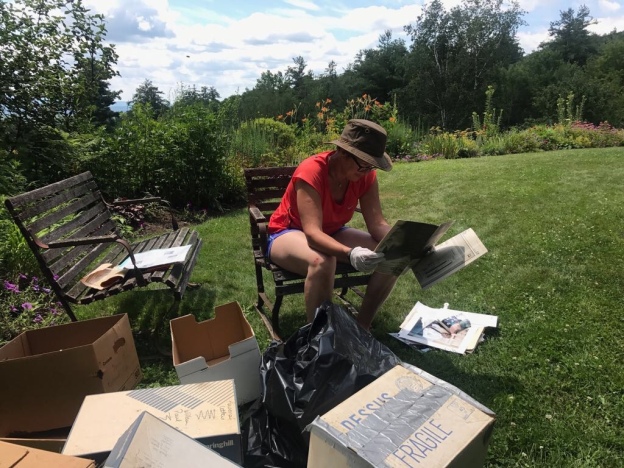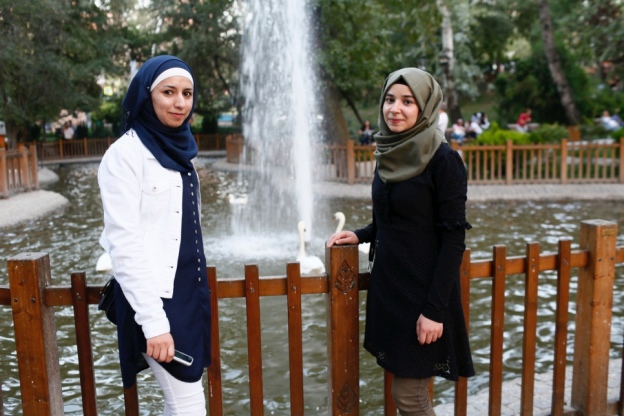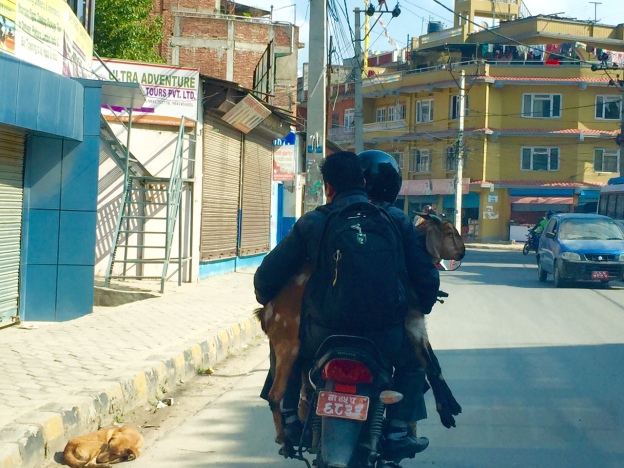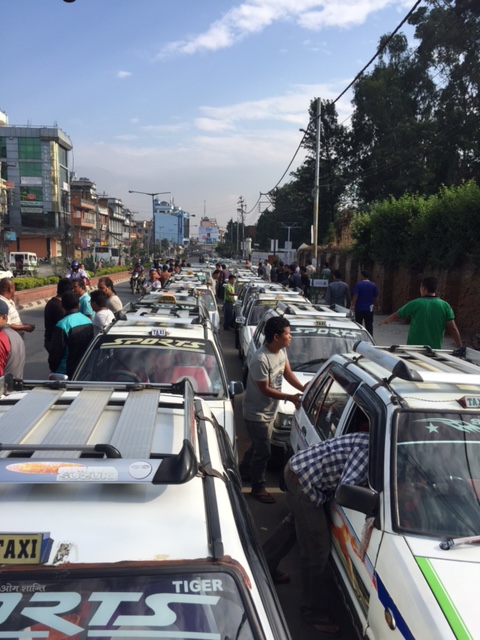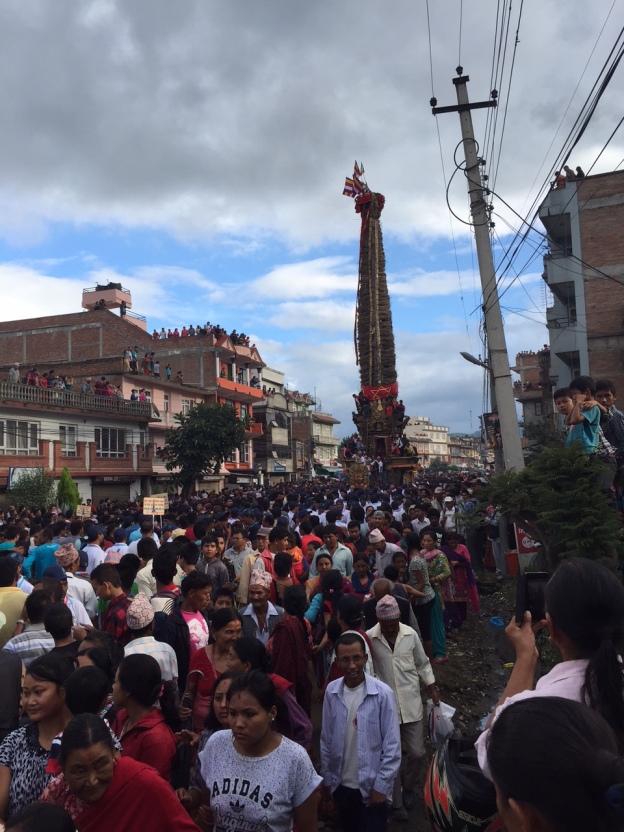This July, on my annual summer pilgrimage home, back to Upstate New York, to the house buried in a forest where I spent every weekend and every summer growing up, and which has always been my haven in my 20 or so years overseas, my sister asked me to sort and clean out stacks of my cardboard boxes.
They were piled against a wall in the garage next to our World War II weapons carrier, a still functional grey metal box of a monster, and the vehicle where my father had painstakingly taught me to drive by double clutching. Out of sight, out of mind, I’d avoided this task for years, reluctant to sort through my years from college into journalism then motherhood and all punctuated with permanent wandering. But this time, I knew any lack of action would not sit well with my sister, as the trove of stored family belongings was overflowing.
I am a fan of instant Facebook gratification, not only because of that flattering belief that I have more than a 1,000 friends but also because it is a tool to reconnect with those I have known in all my incarnations whether it be a friend from elementary school, my translator in Mogadishu, My neighbor in Nepal or a collection of friends whose careers and lives I follow. I Instagram because both my 25 and 12-year-old have instructed me that “everyone” does. I am not convinced that being “everyone” is meaningful in any way that might transform my life but like with Facebook, I see the work and communication benefits of instant contact. Still much of my life has been lived before the smart phone.
If I graphed my life as an arc of communication tools, it would begin with the party line we shared with our neighbors in the Catskills. In the lazy no-TV summer days, my sister and I, not yet teenagers, entertained ourselves by listening in to their conversations. I covered crime in New York City, calling my story in to my editor on a pay phone. I filed my first overseas stories about the war in Afghanistan only after I had returned overland to Pakistan and typed them on a telex machine. By 1990, during the first Gulf War, The New York Times provided me with a satellite phone the size of a hip-high refrigerator. In Somalia, I had a four-pound satellite telex that I mounted high above my toilet, tiptoeing on the seat to reach the only window in my room that faced the Indian Ocean satellite. By the time my youngest was born in 2005, the satellite phone fit in my back pocket.
I piled the boxes on the lawn in front of the house, armed with plastic garbage bags and tugged on surgical gloves to battle the mice nests and their detritus. The boxes had not been packed in any particular order. There were stacks of narrow, tan “New York Times” reporter’s notebooks, filled with shorthand notes from my days covering crime in New York City and trekking through the mountains of Afghanistan with the Mujadeddin during the Soviet occupation. I’d picked up police shorthand: ‘F/B/13 DOA. Brother arrested’ (female, black, 13, dead on arrival). In another notebook, I’d scribbled notes next to quotes from a Mujahed commander meeting: “No idea where we are. On my 7th cup of sugared green tea today. Not a soul speaks English. When am I going to get out of here? ”
The notebooks dredged up long buried images. My sloppy, loopy handwriting that skipped lines and sometimes meandered up and down, triggered smell, taste, touch. It was a cold February day in the Bronx. On the street, men warmed their hands stoking wood fires in old oil drums. For weeks, the leather jacket I had worn that day smelled of rancid alcohol and stale cigarettes. Sobbing, the mother hugged me as we walked through the tiny bare apartment. The daughter’s blood still stained the floor near a piece of her half eaten birthday cake.Tangible hopelessness.
The Afghanistan notes had been written a year before the Bronx when my world did not go beyond the arid Hindu Kush mountains. Afghanistan was my first war, warped by sharply defined feelings of love, hate, boredom, fear and adventure. I kept taped to my laptop a quote from Tim O’Brien’s “The Things They Carried.” “War is nasty; War is fun. War is thrilling; War is drudgery. War makes you a man; War makes you dead.” Afghanistan — The ever-present dust, that fine layer of earth, a mixture of grit and silk. The person I used to be but am no longer.
But the notebooks were only part of the boxes’ contents. Stuffed in large manila envelopes were hundreds of letters. I remember writing letters home. But I had forgotten about the return flow from my family and friends, a large quilt of my life stitched together by different people at different times. They came typed, single spaced; hand written, one collection of 15 letters on onion paper with delicate artist script; on aerograms with mysterious GPO return addresses from Singapore, Hong Kong, Addis Ababa, Windhoek; filling all the hardback sides of cards and in postcards. There were letters from lovers. I read through a decade-worth where I seem to have spent way too much time trying to create some fantasy I thought was love. There were deep friendships with journalists that still endure today. I also complained a huge amount. I was lonely, alone, lovesick, frustrated, exhausted and despondent. My father (whose writing to me was often limited to postcards) once suggested I write a book entitled: “Letters From a Despondent Correspondent.”
For someone who sometimes cannot remember details from the day before, this flood caught me off guard. It was as if parts of me had somehow been unearthed in an archeological memory dig and I was encountering a self that I recognized in waves of emotions: joy, curiosity, embarrassment, acknowledgment, discomfort and a great deal of surprise.
I unearthed reams of my mother’s weekly, sometimes daily letters. She and I have always had an electric and combustible relationship. As a child, she was my storyteller who taught my imagination to soar but also my relentless and strict teacher who forcefully tutored me in Latin, Greek, German and Dante. We had a history of bruising arguments well into my 30s.
The scores of letters in the boxes reconnected me to a time and place where we shared ideas and dreams, in a medium that freed us of dictates and combativeness. I needed that nudge to remember. Whether responding to my excited or somber moods, she was a writing machine, supportive, insightful, funny, and deeply understanding. Writing for my mother is a permanent state of mind. Even now at 97, if she could forego oxygen, she would trade it in for pen and paper.
When airmail was too slow or the phone failed, my mother faxed, sometimes daily, as during the Rwandan Genocide when I was stranded in Kigali at the Hotel Milles Collines. Those faxes, faded, some only barely legible more than two decades later, were also in the boxes. As was my reply: “Please type! Your handwriting illegible.” But she also spent many pages through the years trying to console me over my hopeless dead-end amorous encounters while emphasizing how they distracted me from reporting and writing.
Every year, as with all her children and grandchildren, her birthday gift was a letter. She typed this letter in 1997 after my return from some war zone, grasping more clearly and more poetically than I ever could, that link between crossing swords and love and respect. I should have listened to her more often.
“I see Dony who taught me not in words but in actions, at times against my will(…) to break through barriers enjoying the noise of the crash, to live like a pilgrim of the earth which means to be a foreigner in every country because the country you long for is not the one you are in. To be happy in my unhappiness, to be satisfied in my dissatisfaction, cheerful in my solitude. I learned by watching her, by blaming her, by cursing her at times. (…) It is the Dony that gives me the most useless advice and then overwhelms me with the most useful embrace. …Please walk on Donatella, Just as you are. Do not change. Your strength is in being yourself.”
I’d forgotten about the beauty and pleasure of receiving letters, of keeping them in my pocket so I could pull them out to read and re-read, to know that they were my companions no matter where I lived. They were a concrete proof that I existed. As for the contents of all those boxes: they make me who I am.

